
"Angel of the Morning" is a popular song written by Chip Taylor, originally recorded by Evie Sands but which first charted with a version by Merrilee Rush. The song has been covered by many artists including Chrissie Hynde, Dusty Springfield, P. P. Arnold, Connie Eaton, Mary Mason, Guys 'n' Dolls, Melba Montgomery, Olivia Newton-John and Juice Newton, who reached the Billboard Hot 100 top ten with her version in 1981.
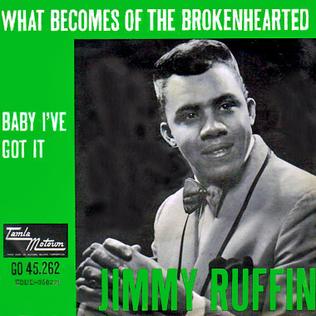
"What Becomes of the Brokenhearted" is a hit single recorded by Jimmy Ruffin and released on Motown Records' Soul label in the summer of 1966. It is a ballad, with lead singer Jimmy Ruffin recalling the pain that befalls the broken-hearted who had love that's now departed.

"Sea of Love" is a song written by John Philip Baptiste and George Khoury. It was the only top-40 chart-maker for Phillips, who never recorded another hit.

"Breaking Up Is Hard to Do" is a song recorded by Neil Sedaka, co-written by Sedaka and Howard Greenfield. Sedaka recorded this song twice, in 1962 and 1975, in two significantly different arrangements, and it is considered to be his signature song. Between 1970 and 1975, it was a top-40 hit three separate times for three separate artists: Lenny Welch, The Partridge Family and Sedaka's second version. The song was also adapted into multiple languages, most notably in Italian and French.

"New York Groove" is a song written by English musician and producer Russ Ballard. The song was originally recorded by glam rock band Hello in 1975 and was later covered by Ace Frehley (Kiss) for his 1978 solo album. Frehley's version is also well known, especially in the US.

"Hello, I Love You" is a song recorded by American rock band the Doors for their 1968 album Waiting for the Sun. Elektra Records released it as a single that same year, which topped the charts in the U.S. and Canada. Although the Doors are credited as the songwriters, songs by other artists have been identified as likely sources.
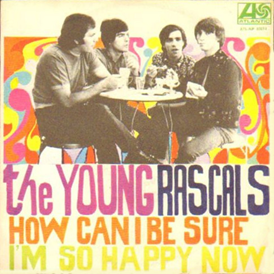
"How Can I Be Sure" is a popular song written by Felix Cavaliere and Eddie Brigati, and originally recorded by the Young Rascals for their 1967 album Groovin' with a single release in August 1967 affording the group their fourth Top 10 hit.
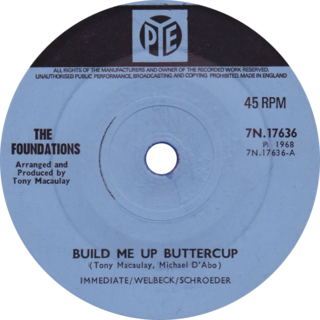
"Build Me Up Buttercup" is a song written by Mike d'Abo and Tony Macaulay, and released by The Foundations in 1968 with Colin Young singing lead vocals. Young had replaced Clem Curtis during 1968, and this was the first Foundations hit on which he sang.
"Mama Said" is a song performed by the Shirelles, written by Luther Dixon and Willie Denson. It became a top-ten hit, on both the pop and R&B charts, when it was released as a single in 1961. "Mama Said" went number four on the Billboard Hot 100 and number two on the R&B chart and has been covered by American Spring, Melanie, Dusty Springfield, the Stereos, the Growlers, and a young Dionne Bromfield. It was also the inspiration for "Days Like This" by Van Morrison. Nick Lowe covered it on his 2001 album, The Convincer.

"Groovin'" is a song written by the American singer songwriters Felix Cavaliere and Eddie Brigati, initially recorded by their group the Young Rascals in 1967. Cavaliere was inspired to compose the song by his girlfriend Adrienne Buccheri, whom he only got to meet on Sundays amidst heavy touring and recording. Musically, the song differs from most of band's previous output, leaving the garage rock genre for Latin American influences, such as baião. Lyrically, "Groovin'" tells the tale of a narrator spending time with his partner on a Sunday afternoon. The song was arranged and recorded at the Talentmasters Studios, New York City in March of 1967.

"People Got to Be Free" is a song released in 1968 by the Rascals, written by Felix Cavaliere and Eddie Brigati and featuring a lead vocal from Cavaliere.

"Hair" is the title song to the 1967 musical Hair and the 1979 film adaptation of the musical.

"C'mon Marianne" is a song composed by L. Russell Brown and Raymond Bloodworth and popularized by The Four Seasons in 1967. Produced by Bob Crewe, the single was the last Four Seasons single to reach the Top Ten of the Billboard Hot 100 chart in the 1960s, and their last Top Ten hit until "Who Loves You" in 1975.

"Drivin' My Life Away" is a song co-written and recorded by American country music artist Eddie Rabbitt. It was released in June 1980 as the first single from the album Horizon. The song was written by Rabbitt, Even Stevens and David Malloy.

"The Most Beautiful Girl" is a song recorded by Charlie Rich and written by Billy Sherrill, Norro Wilson, and Rory Bourke. The countrypolitan ballad reached No. 1 in the United States in 1973 on three Billboard music charts: the pop chart, the country chart, and the adult contemporary chart, as well as in Canada on three RPM charts: the RPM 100 Top Singles chart, the Country Tracks chart, and the Adult Contemporary chart. Billboard ranked it as the No. 23 song for 1974.
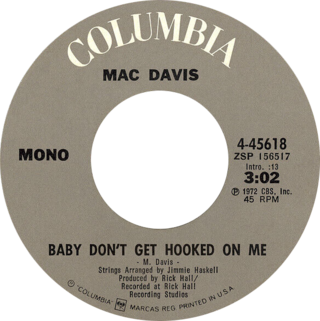
"Baby Don't Get Hooked on Me" is a hit song by country and pop singer-songwriter Mac Davis. From his breakthrough album of the same name, the song reached No.1 on both the Billboard Hot 100 and Easy Listening charts in September 1972, spending three weeks atop each chart. Billboard ranked it as the No. 8 song of 1972. Davis wrote it when the record company demanded he write a tune with a "hook".

"She's a Lady" is a song written by Paul Anka and released on his album Paul Anka '70s. The most successful recording was performed by Tom Jones and released at the beginning of 1971. It is Jones's highest-charting single in the U.S..

"All I Know" is a song written by American songwriter Jimmy Webb, first recorded by Art Garfunkel on his 1973 debut solo album, Angel Clare, released by Columbia Records. Instrumental backing was provided by members of the Wrecking Crew, L.A. session musicians. Garfunkel's version is the best known and highest-charting version, peaking at number nine on the Billboard Hot 100 and number one on the Easy Listening chart for four weeks in October 1973. Garfunkel's version begins with a solo piano, before he begins to sing. When the orchestration is beginning to fade out, the solo piano takes over, playing melodic passages to the song's end.
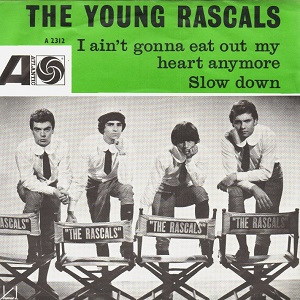
"I Ain't Gonna Eat Out My Heart Anymore" is a song written by Pam Sawyer and Laurie Burton in 1965. Originally envisioned to be recorded by a British Invasion artist, the song was extremely well liked by the American rock group the Young Rascals, and they subsequently recorded the song and released it as their debut single in November 1965 through Atlantic Records. Though only a marginal hit, reaching number 52 on the Billboard Hot 100, it largely established the band on the American music scene. It has since been included on several albums by the band, including their eponymous debut album, and several compilation albums, including Time Peace: The Rascals' Greatest Hits, on which it was the opening track.

"Me and My Arrow" is a song written and recorded by American singer-songwriter Harry Nilsson for his 1970 album The Point! It was also released as a single in 1971, reaching number 34 on the US Billboard Hot 100 and number 3 on the Adult Contemporary chart.



















